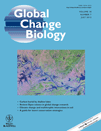
GLOBAL CHANGE BIOLOGY
Scope & Guideline
Shaping the Future of Ecology and Environmental Science
Introduction
Aims and Scopes
- Climate Change Impacts on Biodiversity:
Research examining how climate change affects species distributions, population dynamics, and ecosystem functions, providing insights into the resilience and adaptability of various organisms. - Ecosystem Functioning and Services:
Studies investigating the impacts of environmental changes on ecosystem services, including carbon sequestration, nutrient cycling, and water regulation, highlighting the role of ecosystems in mitigating climate change. - Human-Induced Environmental Change:
Exploration of how human activities, such as land-use change, pollution, and resource extraction, alter ecological processes and contribute to biodiversity loss. - Microbial and Soil Dynamics:
Investigations into the roles of microbial communities in soil health, nutrient cycling, and carbon dynamics, particularly in the context of changing environmental conditions. - Marine and Aquatic Ecosystems:
Research focused on the impacts of climate change, pollution, and habitat destruction on marine and freshwater ecosystems, including the responses of aquatic species and communities. - Plant Responses to Global Change:
Studies on plant physiology, phenology, and community dynamics in response to climate variability, including the effects of temperature, precipitation, and atmospheric CO2 levels. - Conservation and Management Strategies:
Research aimed at developing effective conservation practices and management strategies to preserve biodiversity and enhance ecosystem resilience in the face of global change.
Trending and Emerging
- Climate Adaptation and Mitigation Strategies:
An increasing focus on practical strategies for climate adaptation and mitigation, exploring how ecosystems can be managed to enhance resilience and reduce vulnerabilities to climate change. - Interdisciplinary Approaches to Ecology:
Emerging themes emphasize the integration of ecological research with social sciences, economics, and policy-making to address complex environmental challenges. - Microbial Interactions and Soil Health:
Growing interest in the role of soil microbiomes in ecosystem functions, including their contributions to carbon cycling and nutrient dynamics under changing climatic conditions. - Remote Sensing and Big Data Analytics:
The use of advanced remote sensing techniques and big data analytics is becoming prevalent for monitoring ecological changes and assessing the impacts of global change on biodiversity. - Resilience and Recovery Studies:
Research on ecosystem resilience and recovery processes following disturbances, such as wildfires or climate extremes, is gaining traction as scientists seek to understand and enhance ecosystem stability. - Functional Trait-Based Ecology:
A shift towards functional trait-based approaches to studying species interactions and ecosystem responses, providing insights into the mechanisms driving biodiversity and ecosystem functioning. - Impact of Climate Extremes on Ecosystems:
An increased emphasis on understanding the effects of climate extremes, such as heatwaves and droughts, on species interactions and ecosystem dynamics.
Declining or Waning
- Historical Biogeography Studies:
While foundational, research on historical biogeography appears to be less prominent in recent publications as the focus shifts toward contemporary impacts of climate change and immediate ecological responses. - Traditional Species-Specific Studies:
There is a noticeable decrease in studies focusing solely on single species responses, as more research emphasizes community-level interactions and ecosystem-wide effects. - Static Models of Ecosystem Dynamics:
The reliance on static models for predicting ecosystem responses is waning, with a shift toward dynamic, multi-factorial approaches that account for the complexities of real-world interactions. - Invasive Species Impact Studies:
Research specifically dedicated to the impacts of invasive species on ecosystems seems to be less frequent, possibly due to a broader focus on integrated ecological responses to global change. - Localized Case Studies:
With the growing emphasis on global patterns and trends, localized case studies that do not connect to larger ecological or climatic frameworks are becoming less common in the journal.
Similar Journals

ECOGRAPHY
Pioneering Research for a Resilient PlanetECOGRAPHY, published by WILEY, stands at the forefront of ecological and evolutionary research, with an impressive Impact Factor reflecting its esteemed position in the Q1 category of Ecology, Evolution, Behavior, and Systematics. Operating since 1978 and transitioning to a fully Open Access model in 2020, the journal is dedicated to disseminating high-quality research that influences conservation practices and enhances our understanding of ecological dynamics. With an ISSN of 0906-7590 and an E-ISSN of 1600-0587, ECOGRAPHY has garnered a remarkable placement in Scopus rankings, being in the top 4% of its category, achieving an impressive rank of #27 out of 721 in Agricultural and Biological Sciences. Academics from around the globe benefit from the research published in this journal, which seeks to engage and inspire further exploration of ecological systems. For inquiries, ECOGRAPHY can be reached at their UK address: 111 River St, Hoboken 07030-5774, NJ.

Frontiers in Marine Science
Charting Innovative Solutions for Marine ChallengesFrontiers in Marine Science, published by FRONTIERS MEDIA SA, stands as a leading open-access journal dedicated to advancing our understanding of marine ecosystems and their interconnectedness with global environmental systems. With a focus that spans a range of vital sub-disciplines including Aquatic Science, Oceanography, and Ocean Engineering, this journal has achieved prestigious rankings within the Q1 category in multiple areas as of 2023. The journal, thriving since its inception in 2014, promotes high-quality, peer-reviewed research that addresses critical challenges in marine and environmental science, making it an invaluable resource for researchers, professionals, and students alike. Located in Switzerland, Frontiers in Marine Science is committed to accessible scientific knowledge, boasting an impressive impact through a wide array of contributions from the global community. The journal's aim is to foster collaborative research efforts and innovative responses to the pressing issues facing our oceans and waterways today.

ECOSYSTEMS
Advancing ecological knowledge for a sustainable future.ECOSYSTEMS, an esteemed journal published by SPRINGER, stands at the forefront of ecological research with a distinguished Q1 quartile ranking in multiple categories, including Ecology, Evolution, Behavior and Systematics, and Environmental Chemistry for 2023. Founded in 1998, the journal has become crucial for advancing our understanding of ecosystem dynamics and interactions, offering researchers a platform to disseminate significant findings relevant to ecological health and sustainability. Although Open Access is not available, the journal maintains a robust reputation, evidenced by its high Scopus rankings—placing it within the top 10% in diverse ecological domains. With a publication scope that spans fundamental and applied aspects of ecosystems, ECOSYSTEMS serves as an essential resource for professionals and students pursuing innovative ecological solutions, making it indispensable for contributing to the global conversation on environmental sustainability. For more information, please visit the publisher's site or access your institution's library resources.

GLOBAL ECOLOGY AND BIOGEOGRAPHY
Advancing Insights in Ecology and BiogeographyGLOBAL ECOLOGY AND BIOGEOGRAPHY is an esteemed academic journal published by Wiley that focuses on the dynamic interplay between ecological and biogeographical processes across the globe. With a strong commitment to advancing our understanding of biodiversity, conservation, and global change, this journal has secured a prestigious Q1 ranking in several categories, including Ecology, Ecology, Evolution, Behavior and Systematics, and Global and Planetary Change, highlighting its significant influence in the field. Since its inception in 1998, the journal has consistently provided a platform for high-quality research, featuring original articles that address critical ecological questions and emerging biogeographical trends. Researchers aiming to publish impactful work will appreciate the journal's rigorous peer-review process and its accessibility to a global audience. With a commendable track record reflected in its Scopus rankings, this journal is an essential resource for anyone dedicated to the study of ecology and biogeography.
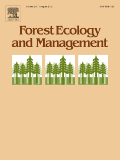
FOREST ECOLOGY AND MANAGEMENT
Elevating Knowledge in Forest EcosystemsFOREST ECOLOGY AND MANAGEMENT is a premier peer-reviewed journal dedicated to the integral study of forest ecosystems and their management, published by Elsevier in the Netherlands. With an impactful presence in the field, this journal boasts a prestigious Q1 ranking in multiple categories, including Forestry, Management, Monitoring, Policy and Law, and Nature and Landscape Conservation as of 2023. It addresses key issues relevant to sustainable forest practices, conservation strategies, and environmental monitoring, making it a vital resource for researchers, practitioners, and policymakers alike. The journal is indexed with an impressive Scopus rank, placing it among the top tier of titles in Agricultural and Biological Sciences and Environmental Science. While it does not offer Open Access options, its rigorous review process and high visibility make it essential for those seeking to stay abreast of the latest findings and trends in forest ecology and management. Published continuously since 1976, FOREST ECOLOGY AND MANAGEMENT aims to foster interdisciplinary collaboration and advance knowledge critical to the stewardship of forest resources in an ever-changing global landscape.
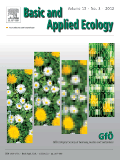
BASIC AND APPLIED ECOLOGY
Exploring the intricate connections of nature and science.BASIC AND APPLIED ECOLOGY, published by Elsevier GmbH in Germany, stands out as a premier journal in the field of ecology, evolution, behavior, and systematics. With its ISSN 1439-1791 and E-ISSN 1618-0089, the journal enjoys a distinguished reputation, evidenced by its classification in the Q1 category for Ecology in 2023 and impressively ranking #89 out of 721 in this domain according to Scopus. Since its inception in 2000, it has served as a vital platform for disseminating high-quality research that bridges theoretical insights and practical applications in ecology. Researchers, professionals, and students alike can look forward to the latest findings that not only foster a deeper understanding of ecological processes but also inform sustainable practices crucial for our environment. As the journal continues its journey through to 2024, it remains committed to advancing ecological knowledge and supporting innovative research in an ever-evolving field.
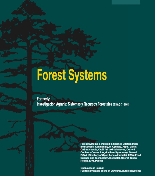
Forest Systems
Fostering collaboration in ecology, forestry, and soil science.Forest Systems, an esteemed open-access journal published by CONSEJO SUPERIOR INVESTIGACIONES CIENTIFICAS-CSIC in Spain, has been a dedicated platform for advancing knowledge in the fields of ecology, forestry, and soil science since its inception in 1991. With an ISSN of 2171-5068 and E-ISSN 2171-9845, the journal is committed to disseminating high-quality research that addresses critical issues related to forest ecosystems and their management. Forest Systems is positioned within the Q4 category in Ecology, Evolution, Behavior and Systematics, and Q3 in both Forestry and Soil Science, evidencing its growing influence and relevance in these disciplines. Researchers will find a rich repository of articles that not only contribute significantly to academic discourse but also foster practical solutions to contemporary environmental challenges. As it converges from 2010 to 2024, the journal aims to enhance its outreach and impact, facilitating access for professionals, students, and policymakers committed to sustainable forest management and ecological conservation.

THALASSAS
Fostering Innovation in Marine ResearchTHALASSAS is a prominent academic journal specializing in the fields of Aquatic Science and Oceanography, published by Springer International Publishing AG. Established in 2005 and running through 2024, this journal serves as a vital platform for sharing groundbreaking research and innovative findings related to the marine environment and its ecosystems. With an ISSN of 0212-5919 and an E-ISSN of 2366-1674, THALASSAS is indexed in Scopus and currently holds a Q3 classification in both Aquatic Science and Oceanography for 2023, reflecting its relevance and contribution to these scientific disciplines. Although it does not follow an Open Access model, THALASSAS offers valuable insights for researchers, professionals, and students interested in sustainable ocean management and aquatic biodiversity. Its rigorous peer-review process ensures that published articles meet the highest standards of academic quality, fostering a deeper understanding of marine sciences and addressing critical issues facing aquatic systems today.

Neotropical Biodiversity
Unveiling the secrets of biodiversity in the Neotropics.Neotropical Biodiversity is a prominent journal dedicated to advancing our understanding of biodiversity and ecological dynamics within the Neotropical region. Published by TAYLOR & FRANCIS LTD in the United Kingdom, this Open Access journal has been providing unrestricted access to research findings since 2015, fostering collaboration and knowledge sharing among the global scientific community. With an emphasis on innovative research in Ecology, Ecology, Evolution, Behavior and Systematics, and Global and Planetary Change, it has earned a reputation for excellence, currently holding a Q3 category in its field. As of 2023, the journal ranks in the 37th percentile for Environmental Science (Ecology) and in the 36th percentile for Agricultural and Biological Sciences (Ecology, Evolution, Behavior and Systematics), making it a valuable resource for researchers, professionals, and students interested in understanding and preserving biodiversity in one of the world's most diverse ecosystems. We invite you to explore the cutting-edge research published in Neotropical Biodiversity and contribute to the ongoing dialogue for environmental sustainability and ecological resilience.
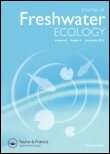
JOURNAL OF FRESHWATER ECOLOGY
Driving impactful research for ecological conservation.JOURNAL OF FRESHWATER ECOLOGY, published by Taylor & Francis Inc, is an esteemed source of research dedicated to advancing the understanding of freshwater ecosystems. Established in 1981, this Open Access journal has provided a platform for innovative studies and groundbreaking articles relevant to the fields of Aquatic Science and Ecology. With its HIndex reflecting a commitment to quality scholarship, the journal is currently classified in the Q3 category for both Aquatic Science and Ecology, Evolution, Behavior and Systematics, indicating its respectable impact within these disciplines. The journal ranks within the 45th percentile in Ecology and the 41st percentile in Aquatic Science on Scopus, highlighting its relevance to a global audience of researchers and practitioners. By facilitating unrestricted access to research findings since 2017, JOURNAL OF FRESHWATER ECOLOGY aims to enrich our understanding of freshwater systems and their conservation, making it an essential resource for those invested in ecological research and environmental sustainability.